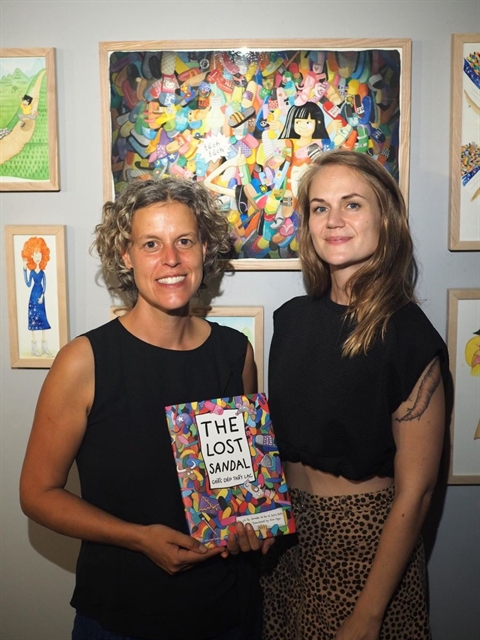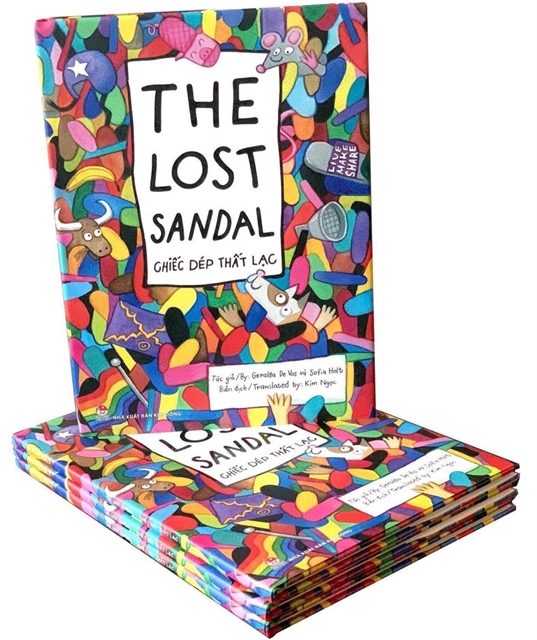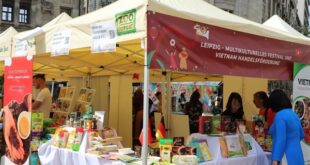
Belgian writer Geralda De Vos and Swedish illustrator Sofia Holt won the Dế Mèn Award for their bilingual picture book Chiếc Dép Thất Lạc (The Lost Sandal). The award ceremony was held by the Vietnam News Agency’s Thể Thao & Văn Hóa (Sports & Culture) daily last week in Hà Nội.
Reporter Công Bắc chats with the two authors about the award-winning book.
Can you share more about the idea to start writing The Lost Sandal?
De Vos: In the autumn of 2019, I joined the life.make.share artist residency near Hà Nội, with the idea of approaching my collection of sandals through different angles and artistic disciplines.
I started making the famous dép tổ ong (plastic sandal) in ceramics, and I made plates with footprints, I made dép tổ ong – screen prints and I built a street vendor’s sandal shop on a bicycle. My world evolved around sandals at that time.
For the exhibition, I wanted a small text explaining what this vehicle loaded with lost sandals was about.
I started writing and imagining a collector of sandals driving that bicycle. Pretty soon, I realised I was writing far too much, but I could not stop my imagination. Whenever I picked up a child’s sandal, I wondered who might have lost it and if they would be looking for it.
While I was driving my motorbike from Hà Nội to the artist residency in Hiên Vân, Bắc Ninh Province, I imagined Linh losing her sandal and meeting Gingerella. Suddenly, I had created a story in my head.
When I told the story to my youngest son, I started making up new things and extending some parts of the story because I saw he liked it. A few days later, I wrote it all down. That was the first version of The Lost Sandal.
Your book has a lot of details and many Vietnamese characteristics. How did you write it?
Holt: For me as an illustrator, I am very impressed by the visual look of Việt Nam. It is fascinating to see so many new impressions that I am not used to from my country.
In Việt Nam, there are so many colours, people’s creative inventions, and historical objects, as well as nature. The way the Vietnamese people combine all these things in an eclectic mix is the total opposite of our design in Scandinavia, which is very clean and supports the expression “less is more”.
Living in Sài Gòn (former name of Hồ Chí Minh City) for many years opened my eyes to new expressions and gave me memories that will inspire my art and design for the rest of my life. When I painted The Lost Sandal, I used some of this inspiration from my own daily life in Sài Gòn and my road trips to the villages in the countryside.
I was also looking at photos Geralda (De Vos) took from her trip up north, visiting the minority villages.
These photos have been a very good base for the background and details of the drawings in the book. One example of inspiration, because we have lived in Việt Nam for many years, is that we know very well about the widespread visitor in everyone’s house, the cockroach.
Therefore we chose to place a cockroach on every page of our book. The kids love to play the game to find the hidden cockroach somewhere, maybe on the bicycle basket or who knows where.
De Vos: I think this would be a separate interview. I cannot express so many encounters, discoveries, joy, and misunderstandings in one answer.
But I can definitely agree with the statement that I share a lot of affection for the country and its people.
Sofia (Holt) loves to draw details, and I was very amused by her illustrations. The detailed illustrations are a way for us to cherish all the things we’ve seen and learned about in Việt Nam.
Maybe the illustrations are also a way to show Vietnamese people how unique this country and culture is. For people around the world, a nice and inexpensive way to travel to Asia is just by reading the book.
Many Vietnamese people worldwide have bought the book, read it to their children, and probably told them about ‘home’.
It shows the reader a lot of particularities about Việt Nam without teaching or explaining them. Just to read, look and wonder.

What message do you want to send to children?
De Vos: I believe the first purpose of story books is to bring joy and imagination to children’s lives.
Whatever message or values are taken from it are up to the reader. I’m more interested in what messages the readers take with them from the book than me passing on a message to the readers.
I had no message in mind, and I believe the best books are the ones without hidden or obvious messages.
I believe every reader can be attracted by another aspect of the story and takes it or not as a guidance in life.
Some readers check if they still have both sandals in the morning, others are inspired to wear odd shoes, and some will try harder to find what they’ve lost or ask friends for help.
Whether it’s about embracing differences, consuming less, cherishing daily things, reaching out and helping each other, joining others on a journey, recycling or avoiding trash, it has never been my purpose to pass on a moral value in the book. Nevertheless, the book reflects the imagination of Sofia (Holt) and myself and carries within it many aspects of how we live our lives. – VNS
- Reduce Hair Loss with PURA D’OR Gold Label Shampoo
- Castor Oil Has Made a “Huge” Difference With Hair and Brow Growth
- Excessive hair loss in men: Signs of illness that cannot be subjective
- Dịch Vụ SEO Website ở Los Angeles, CA: đưa trang web doanh nghiệp bạn lên top Google
- Nails Salon Sierra Madre
 VnExpress News The News Gateway of Vietnam
VnExpress News The News Gateway of Vietnam





